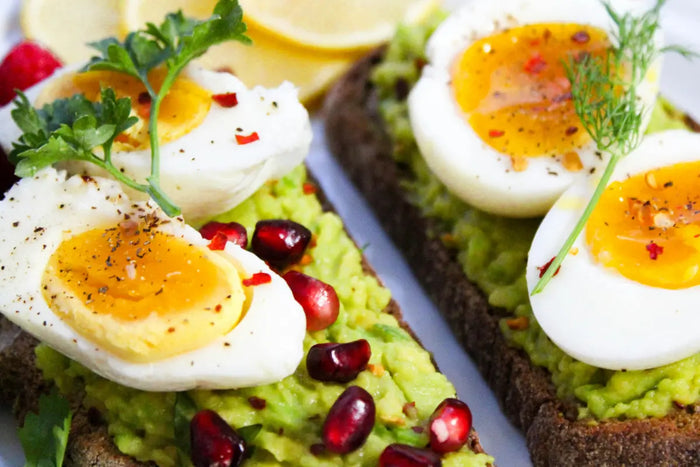When it comes to our health, knowing what constitutes a healthy diet is so important to both our physical and mental wellbeing.
Yet, we all experience such a high amount of information on social media each day; from fad diets to “wellness” trends - it can be easy to get lost in exactly how you should be fuelling your body each day. This is especially true if you’re trying to gain muscle or lose weight.
Admist all the noise however, you might have heard the term ‘macronutrients’ and the benefits they have for overall health. But what exactly are macronutrients? Below we’ve compiled our comprehensive and clear guide to macronutrients, how they impact the body and the benefits of monitoring you’re intake.
What are macronutrients?
First of all, let’s clear something up – what are macronutrients?
Macros, or macronutrients, are the essential nutrients your body needs in large amounts for energy and to maintain its structure and systems. The body cannot make enough of these nutrients to sustain itself on its own, hence why regular intake is so essential for a healthy diet.
Macronutrients can primarily be found in three main food groups:
- Proteins: such as meats like chicken and beef as well as fish and eggs
- Carbohydrates: such as potatoes and corn,
- Fats: such as saturated and unsaturated fats.
Generally, these macronutrients are needed in much higher amounts than other nutrients (hence the term macro).
Macronutrients vs micronutrients
So how does this compare to something else you may have heard about – micronutrients?
The difference between macronutrients and micronutrients, is that your body requires macronutrients in large quantities, and micronutrients in smaller ones – these are normally vitamins and minerals that are taken commonly as supplements to support our energy levels and overall well-being.
When counting your macros, you are counting the grams of macronutrients you are consuming: so how much protein, carbohydrates and fats are in your diet.
How to workout macros and what are the benefits?
Knowing what macronutrients are is one thing, however the greater challenge lies in effectively working out your macro intake as well as what you should be intaking.
To work out your daily intake you need to calculate your daily protein, carbohydrate, and fat needs based on your goals (weight loss, muscle gain, etc.) and then track your consumption through macro counting.
One of the main attractions of counting your macros is that in comparison to calorie-counting diets, in which you count how much of something you are eating, macro counting involves measuring what you are eating – providing much greater flexibility.
Whilst there are a huge number of benefits to counting macros, if you’re someone that has never done this before, the idea of it can be pretty daunting, as the calculation side of things can sound pretty scientific and overwhelming. But don’t worry, we’re here to break it down for you and get you well on your way to counting macros and achieving your wellness and fitness goals.
Greater understanding of your body’s needs
Counting your macros helps you understand where your calories are coming from and how they affect your body – both positively and negatively, so you can make informed changes to your diet if required. Your macronutrient profile is extremely important and reflective of your overall health, so understanding this is a great way to stay healthy.
Not all calories are created equal
Through the counting of macronutrients, you learn that not all calories are created equal, and how to alter your diet to reflect this. What this means, is that all calories have the same amount of energy – but it isn’t really that simple. When it comes to your personal body needs, it’s important to get your calories from healthy sources to properly fuel your body. This means avoiding fatty foods where possible – such as processed carbohydrates.
Great flexibility
Many diets mean that you sometimes have to give up some of your favourite foods. The benefit of counting your macros means that you can eat whatever you want as macro counting is about counting what you eat not how much you are eating. This is great as with the easing of lockdown, you can go out to eat without the stress of worrying about avoiding certain food types. This also means that you’re more likely to stick to the diet – win, win!
Improves workout performance
With the understanding of your macronutrient profile, you will have the confidence to tailor your diet to include the nutrients your body needs and measure results through performance.
Increase in energy levels
As you are listening to you are listening to your body and giving it what it needs, you’re likely to experience an increase in your overall energy levels. This will mean that you reap the benefits in all aspects of life – not just through exercise!
Should I be calculating my Macros?
Think About Your Fitness Goals
Other reasons to count your macros include fitness goals such as:
Overall, counting your macros involves reflecting on your end goal and your daily behaviours and eating habits. If your goal is to lose weight, your macro counting behaviours will be very different to someone who wants to gain muscle, for example.
If you’re looking for a way to understand where your calories are coming from in your everyday food intake, counting your macros is definitely for you. Counting macros can be especially beneficial if you have a specific health goal in mind, such as if you are a bodybuilder who is working towards a particular goal, or an athlete that needs to consume a certain number of calories to sustain their fitness regime.
How to work out macros?
If you’re just starting out with counting your macronutrients, it’s probably best to have a look into an online macro counting calculator. You will need to know how many calories you consume a day on average, or by setting a daily calorie goal, and then work out your ratio (depending on your fitness goal).
Macro ratios for different fitness goals
With the above goals in mind, it’s important to consider your macro ratios.
Weight loss: If you’re aiming to lose weight, a typical macro ratio will feature limited carbs. Typically, you could try a 40% protein ratio, with 40% healthy fats and 20% carbohydrates – the 40/40/20 macro split.
Muscle gain: If you’re aiming to gain muscle, a typical macro ratio is consumption of 40% protein, 30% fat and 30% carbohydrates. This is because protein is the main macronutrient involved in the expansion of muscle mass, so this will be the dominant macro in your diet.
Weight balance: If you’re looking to maintain your weight, you will want to try and achieve a balanced macro ratio. This means a moderate consumption of carbs, whilst maintaining a good level of healthy fats and protein. Try 35% healthy fats, 35% healthy proteins and 30% carbohydrates.
If you’re a vegetarian, you can gain protein benefits from supplements and protein powders to still ensure you’re getting the nutrients you need.
Innermost Thoughts
Counting your macros is a great way to become informed on the nutrients your body is receiving. Pair a great workout routine and healthy dieting behaviours with macro counting, and you’ll meet your fitness goals in no time.
We recommend eating a diet rich in healthy fats, a range of proteins and plenty of fresh fruit and vegetables.
References
- Fat Loss and Muscle Gain: The Right Macros for Your Goals - BarBend. (2021). Retrieved 14 April 2021. Click here.
- Macronutrients: A Simple Guide to Macros | Avita Health System. (2021). Retrieved 14 April 2021. Click here.
- Macronutrients and Human Health for the 21st Century, Venn (2020). Retrieved 27 March 2025. Click here.


















